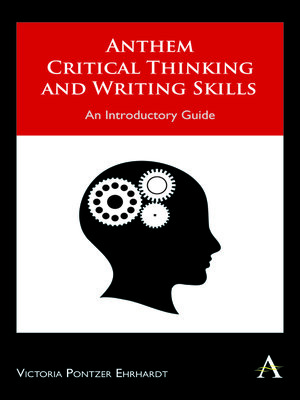Anthem Critical Thinking and Writing Skills
ebook ∣ An Introductory Guide
By Victoria Pontzer Ehrhardt

Sign up to save your library
With an OverDrive account, you can save your favorite libraries for at-a-glance information about availability. Find out more about OverDrive accounts.
Find this title in Libby, the library reading app by OverDrive.



Search for a digital library with this title
Title found at these libraries:
| Library Name | Distance |
|---|---|
| Loading... |
'Anthem Critical Thinking and Writing Skills: An Introductory Guide' helps readers in the process of critical thinking and persuasive speaking and writing. The concepts of critical thinking and evaluation are presented in a clear, easy-to-understand format. Students learn how to form a proposition, identify issues, gather evidence, and process an argument.
Logic games, puzzles, and real life examples ask students to evaluate how we evaluate, analyze, and decide. Then a more formal look at induction and deduction challenges students to practice higher-level thinking skills, such as the use of analogies for evaluation, and working through syllogisms to process ideas. Instruction is included on processing a formal persuasive paper. Readers can have some literary logic fun by analyzing old standards like 'Love is a Fallacy' and the persuasive love poem 'The Passionate Shepherd'.
Short chapters and clear practice exercises make the book easy to use as a basic or supplemental text.
|'Anthem Critical Thinking and Writing Skills: An Introductory Guide' helps readers in the process of critical thinking and persuasive speaking and writing. The text discusses informal thinking, the formal processes of induction, deduction, and syllogistic reasoning, in a clear format that makes it easy for the 'beginning logician' to process. Students learn how to form a proposition, identify issues, gather evidence, and process an argument.
To get started, logic games, puzzles, and real life examples ask students to consider how we evaluate, analyze, and decide. What happens if Janie says, 'Mom, can I go to the party? All of my friends are going!' And Mom responds, 'What if all of your friends jumped off the empire State building?' Is 'all of my friends are going' a good reason? Does mom have a point? Language and logic will help students evaluate these everyday decisions. Then a more formal look at induction and deduction challenges students to practice higher-level thinking skills, such as using analogies for evaluation, and working through syllogisms to process ideas. After a review of the Greek Fallacies, readers can have some literary logic fun by analyzing old standards like 'Love is a Fallacy' and the persuasive love poem 'The Passionate Shepherd'.







